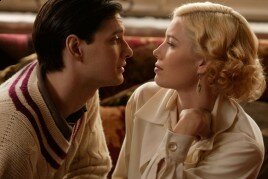What can I say? I’m a sucker for period drama, especially if it involves Colin Firth, stunning dresses and a grand English mansion. No, really – what could be better than a decadent manor house, gorgeous 20’s fashion and a brooding Colin Firth to top it all off?
Firth as WWI veteran and father of three Jim Whittaker loses none of his Darcy-ish aloofness and mystique, but in this role he also displays endearing acceptance and a kind of beaten-down softness not as evident in the Darcy characters. But it is matriarch of the family, Mrs Whittaker, (Kirsten Scott Thomas) who wields all of the power over Mr Whittaker, their three adult children, the servants, the dog and anybody else she can manipulate and control. But her carefully controlled life goes into meltdown when her son John (Ben Barnes) returns home from a jaunt abroad married to his ‘floosy’, and the ensuing power struggle between the two women becomes the focus of the film.
But it is not just a struggle between the women, rather a struggle between old and new, traditional and modern. The ‘floosy’, Larita, (Jessica Biel) is from the new breed – young, fast, liberal, pant-wearing and (gasp) American. The successful female racing car driver and widower greatly contrasts the stuffy and uptight English aristocracy that she marries into, who are all trying desperately to hold on to family legacies and a world of titles, hunts, balls and little actual work.
Larita couldn’t have been a worse fit into the refined country life that John seems destined for, and can’t put a foot right in the eyes of Mrs Whittaker and her two vindictive daughters. Mr Whittaker, however, can see elements of himself in Larita and becomes her ally at every turn.

|
The film continually uses windows, mirrors and other reflective surfaces to literally reflect and pause upon life both past and present. At times, however, it struggles with humorous interludes that drag on too long, although it’s comedic value is saved by the absurdities of the upper-class coupled with snide remarks from various characters, with Kris Marshall often threatening to steal the show in his minor role as the butler.
Despite the increase in frustration on all sides of battle between Mrs Whittaker and Larita, the resolution of the film is not quite a resolution at all. Easy Virtue is an adaptation of a Noel Coward play, and its meandering nature makes it easy to see why it is not one of his most popular. Despite a winding but enjoyable build up, it seems to never really reach a satisfying climax and takes a kind of ‘easy way out’ to apparently solve the problems of the central characters. Minor subplots are left unexplored and unanswered, with mere hints of secondary storylines and alternate possibilities. Although I do not know the original play myself, from all reports it is not a failed adaptation, unlike Alfred Hitchcock’s 1928 silent version. But had the plot been tailored more to suit the medium of film and had firmly focussed on being a poignant drama instead of a watery comedy, it may well have ended up much more concrete and satisfying.
Verdict:
Colin Firth may have moved on to father roles, but glimpses of his sex appeal break through in the tango finale, and the film is worth seeing if only for this and the breathtaking 20′s dresses and hairstyles. A reasonably enjoyable couple of hours at the cinema though – take your mum along. (I did!)





![The King of Ping Pong [Ping-pongkingen] (Review) The King of Ping Pong [Ping-pongkingen] (Review)](/wp-content/uploads/t_1892pingpon1-150x150.jpg)










